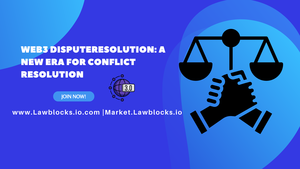Empowered Users, Streamlined Processes: Web3 Arbitration Explained
الجسم
Introduction
The way we settle disputes is undergoing a dramatic transformation. Enter Web3 Dispute Resolution, a revolutionary approach powered by blockchain technology that promises a faster, fairer, and more user-centric way to resolve conflicts in the digital age. Ditch the traditional courtroom drama and embrace a future where code dictates fair play and transparency reigns supreme. This article delves into the exciting world of Web3 Dispute Resolution, exploring its potential to revolutionize conflict resolution across various sectors.
The Frustrations of Traditional Dispute Resolution
The current dispute resolution system is riddled with inefficiencies:
Glacially Slow
Litigation can drag on for years, leaving participants frustrated and financially drained.
Exorbitant Costs
Legal fees can be astronomical, often pricing out individuals and businesses from seeking fair resolution.
Geographical Limitations
Traditional courts operate within geographical boundaries, making international disputes cumbersome.
Lack of Transparency
The complexities of legal proceedings can leave participants feeling powerless and confused.
Web3DisputeResolution
Web3 Dispute Resolution offers a compelling alternative:
Empowering Users
By leveraging blockchain technology, Web3 solutions place users in control. Choose your arbitrators, set the parameters, and experience a dispute resolution process tailored to your needs.
Swift Resolutions
Smart contracts, self-executing agreements written in code, automate key aspects of the arbitration process, leading to significantly faster outcomes than traditional litigation.
Reduced Costs
Eliminating intermediaries and streamlining procedures drastically reduces the overall cost of dispute resolution.
Global Accessibility
Web3 platforms operate on a decentralized network, making them accessible to parties from anywhere in the world.
Enhanced Transparency
All proceedings are recorded on a tamper-proof blockchain ledger, ensuring complete transparency and accountability throughout the process.
Beyond Efficiency
Web3 Dispute Resolution goes beyond streamlining processes:
Community-Driven Justice
Dispute resolution can be facilitated by a jury of token holders within the blockchain ecosystem, fostering a sense of community involvement and trust.
Enforced Outcomes
Judgments from Web3 arbitration platforms can be integrated with smart contracts, ensuring the automatic execution of agreed-upon resolutions.
Dispute Prevention
Smart contracts can be programmed with dispute resolution mechanisms, potentially preventing conflicts from arising in the first place.
A Glimpse into the Future: The Evolving Landscape of Web3DisputeResolution
The future of Web3 Dispute Resolution is brimming with exciting possibilities:
AI-powered Assistance
Artificial intelligence can analyze complex disputes, suggest potential resolutions, and assist arbitrators in their decision-making.
Domain-Specific Platforms
Specialized Web3 platforms could emerge to handle specific areas like DeFi or NFT disputes, offering tailored expertise and streamlined processes.
Integration with DeFi Protocols
Web3 Dispute Resolution platforms could seamlessly integrate with Decentralized Finance (DeFi) protocols, allowing for efficient dispute resolution within the DeFi ecosystem itself.
Challenges and Considerations
Despite its potential, Web3 Dispute Resolution faces some challenges:
Legal Recognition
The legal framework surrounding Web3 arbitration is still evolving, and their rulings may not be universally recognized by traditional courts.
Scalability
Current blockchain platforms may struggle to handle the high volume of data associated with complex disputes.
Security Concerns
Ensuring the security and integrity of Web3 dispute resolution proceedings is crucial for user trust and adoption.
Collaboration is Key
The success of Web3 Dispute Resolution hinges on collaborative efforts:
Developing Scalable Solutions
Investing in research and development of scalable blockchain solutions is essential for robust Web3 arbitration operations.
Promoting Education and Awareness
Educating legal professionals and the public about Web3 Dispute Resolution and its potential benefits is crucial for wider adoption.
Open Dialogue with Regulators
Collaborative efforts with policymakers are necessary to establish clear regulations and ensure the legitimacy of Web3 arbitration rulings.
Conclusion
Web3 Dispute Resolution is not a silver bullet, but it represents a significant leap forward in conflict resolution. By harnessing the power of blockchain technology, we can create a future where disputes are resolved swiftly, fairly, and with user empowerment at the core of web3 based legal platform. Imagine a world where disputes are settled efficiently, costs are lower, and transparency reigns supreme. Web3 Dispute Resolution is paving the way for this future, one line of code at a time. Are you ready to embrace a new era of conflict resolution? Join









تعليقات